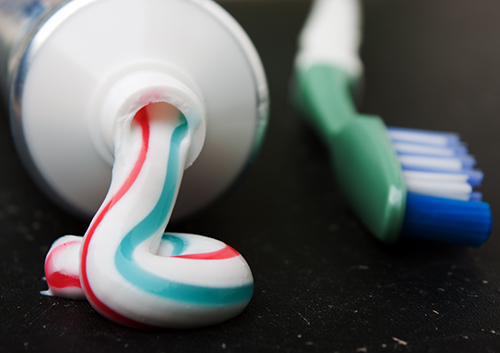What's in toothpaste and how does it work?
November 13th, 2024

Drs. Peter Vogel, Vijal Vadecha and our team recommend that you brush your teeth two to three times a day, for at least two minutes each time. But have you ever wondered what’s in toothpaste and how it actually works? The mouth is home to more than 500 types of microorganisms that feed on leftover food that gets stuck on and around your teeth. Toothpaste is the best line of defense against all those pesky microorganisms (especially when you brush two to three times a day). Here’s how it works.
Abrasives
Toothpaste contains mild abrasive additives that combat microorganisms and fight plaque. When you brush, the abrasives in toothpaste dislodge food particles and microorganisms more effectively than if you simply brush your teeth with water. The abrasives also work to remove food stains and polish the surface of the tooth. Some toothpastes include ingredients like triclosan and Xylitol. These chemicals prevent the growth of bacteria that produce plaque. Plaque not only causes cavities, but it can also lead to more dangerous issues like periodontal disease.
Fluoride
Fluoride is key ingredient in toothpaste. As the microorganisms in your mouth feed off the leftover food particles, they leave behind acid and sulfur byproducts that wear away the enamel of the teeth. This is the fancy, technical way of saying that the acid on your teeth causes cavities. As for the sulfur byproduct –well, that’s just a fancy, scientific name for bad breath. Fluoride works to fight the acid and help protect the teeth. By brushing, the fluoride is incorporated into the tooth enamel, which in turn makes the tooth more resistant to acid and plaque.
Flavoring and Sweetening Agents
Not all toothpaste tastes the same, right? The type of flavoring or sweetening agents added to the toothpaste doesn't have anything to do with fighting microorganisms and plaque, but taste is one of the most important selling points in finding a toothpaste brand you like. Flavoring agents mask the taste of some of the other ingredients in toothpaste, and without those agents chances are nobody would be brushing their teeth two to three time a day.
Why Is My Child Getting Cavities?
November 6th, 2024

We want our children to have every advantage, including oral health. That’s why you encourage your child to brush twice a day. You keep the sugary treats to a minimum. You schedule dental exams and cleanings at our Anthem office.
So, how did your child get a cavity? What to do to prevent more tooth decay?
First, don’t feel guilty. Some people are more prone to cavities, even with diligent brushing and flossing. But to make sure children have all the advantages when it comes to preventing cavities, we have some tips which might improve their dental habits.
- Better Brushing
Even for adults, brushing technique can be haphazard! Brushing’s not as effective without covering all the tooth surfaces (inside, outside, and molar tops), holding the brush at a 45° angle, gently brushing the teeth with small strokes, brushing for at least two minutes, and flossing between the teeth at least once a day.
Until children develop the motor skills to brush by themselves (around age six or seven), you can help by monitoring their brushing and flossing. If you like, you can use these four minutes a day for fun as well as dental care by playing music, awarding stickers, using an app with entertaining timers, or having your child mirror your brushing habits as you brush together.
And do make your child’s life easier with the right tools. Brush heads should be small enough to fit in little mouths comfortably, and bristles should always be soft. Floss, too, should be soft and flexible. Don’t forget to retire your child’s brush after three or four months—bristles start to fray and won’t clean effectively.
- Sealing the Deal
Ask about dental sealants. This treatment provides a protective coating for your child’s molars. Cavities are so common in molars because the tops of these teeth are quite uneven. Food particles and plaque are trapped in grooves where brushes have a hard time reaching.
The sealant process is a simple and safe one. Healthy teeth are cleaned and dried, an etching solution prepares the tooth surface, a thin coat of sealant is applied, and the coating is hardened under a curing light.
Drs. Peter Vogel, Vijal Vadecha might recommend sealants when your child’s first adult molars erupt. Enamel takes a while to develop its full strength, so new molars are especially vulnerable to cavities. Sealants typically last from three to five years, and studies have shown a dramatic reduction in cavities when teeth are treated with sealants.
- Fluoride Helps Prevent Cavities—in Two Ways!
Fluoride helps strengthen enamel in developing teeth. Because many communities have fluoride available in their water systems, your child gets the benefit of this natural mineral.
If you’re providing your child with fluoride toothpaste, you’re helping prevent cavities in the teeth, which have already erupted. The acids from oral bacteria weaken the mineral structure of enamel, which is the first step in forming a cavity. Fluoride helps repair weakened enamel in a process known as “remineralization.”
Drs. Peter Vogel, Vijal Vadecha can let you know the amount of fluoride that is right for your child, including how much or how little fluoride toothpaste to use, a prescription supplement if your water doesn’t contain fluoride, or the application of a fluoride treatment directly to your child’s teeth.
- Avoid Tricky Treats
Some treats are much better than others. We’re not talking taste, though. When it comes to dental health, texture and time are more important.
When your child enjoys a plain chocolate bar, saliva helps wash away sugary food particles. Sticky candies and starches, like caramels and potato chips, are a “stickier” problem. They cling to enamel, providing lots of sugar as fuel for cavity-creating bacteria. Similarly, drinking a soda with lunch (not every day, of course!) provides a short exposure to sugars. Sipping sodas throughout the day is like bathing teeth in sugar for hours at a time.
To eliminate some of the treats bacteria love, choose snacks with an eye to how they affect teeth throughout the day, and teach your child to brush or rinse with water after eating.
- Schedule Regular Dental Exams and Cleanings
Most children should be visiting Daisy Mountain Dentistry twice a year, even during the baby teeth years. Drs. Peter Vogel, Vijal Vadecha will monitor your child’s primary teeth and developing teeth and bite. And a professional cleaning removes built up plaque that even the most dedicated brusher might miss.
If you have any concerns about cavities and their prevention, Drs. Peter Vogel, Vijal Vadecha will have suggestions tailored to your child’s individual needs. Us working together to make sure your child has a healthy, confident smile? That’s a partnership that will provide lifelong advantages!
How do I overcome my dental anxiety?
October 30th, 2024

Do you feel anxious before every dentist appointment? If the answer is yes, you are not alone—more than 75 percent of Americans feel anxious when visiting their dentist. Today, Drs. Peter Vogel, Vijal Vadecha and our team thought we would provide some tips to reduce your stress about visiting our Anthem office.
The first thing we want you to do is plan ahead. If at all possible, book an appointment at a time when you know you won’t be in a rush to get somewhere else, such as picking up your children from school or an important meeting at the office. We also recommend you avoid caffeine and sugar prior to your visit as too much of either can make you feel even more anxious, not to mention jittery.
Once you’re here at our office, take some slow, deep breaths to relax. Then, try to relax your muscles by sitting back comfortably. If you are still feeling anxious, let Drs. Peter Vogel, Vijal Vadecha or someone on our team know. We deal with nervous patients all the time and may have additional relaxation techniques for you to try. If you’d like, we also encourage you to bring headphones and listen to music of your choice to distract yourself while we work on your teeth.
If you have additional questions about relaxation techniques, or would like to schedule an appointment, please give us a call!
Is a Lost Tooth a Lost Cause?
October 23rd, 2024

We’re used to seeing athletes wearing mouthguards at practice or play, because dental trauma is one of the most common (and predictable) sports injuries. But it’s not just athletes who are at risk, and there are some events in our daily lives that we just can’t predict. Car accidents, falls, workplace injuries, even innocent playground structures can take their toll on our smiles.
A major chip or a crack in your tooth is upsetting enough, and should be seen by Drs. Peter Vogel, Vijal Vadecha as soon as possible. It’s even more unnerving when a tooth is knocked out completely. The technical term for a tooth which has been knocked out is an avulsed tooth, and it is a true dental emergency.
If you should suffer a partially or completely dislodged tooth, there is a possibility that your tooth can be reimplanted—if the damage isn’t too severe and if you get to our office immediately.
How can a lost tooth be saved? This is possible because of the complex biological engineering that anchors our teeth within the jaw. The root of a tooth is surrounded by the periodontal ligament. This connective tissue attaches the tooth to the alveolar bone of the jaw. When a tooth is knocked out, this ligament splits apart, leaving some tissue on the tooth root and some within the tooth’s socket.
To successfully reimplant a tooth, the connective tissue cells around the root of the tooth need to be vital, so that they can begin to reattach to the connective tissue left in the socket. Over time, this reattachment is complete, and the tooth becomes firmly anchored to the bone again.
It’s important to protect your tooth before you see Drs. Peter Vogel, Vijal Vadecha to make sure there will be enough healthy tissue for reattachment. First of all,
- Don’t panic! If you or a friend or family member lose a tooth, call your dentist or your emergency health care provider as soon as possible. You will get specific instructions for your specific situation.
If you are unable to reach a healthcare provider immediately, there are some general rules for taking care of an avulsed tooth:
- Find the lost tooth. Don’t touch the root—use the crown, or top part of the tooth, to pick it up. You are trying to preserve and protect the connective tissue on the root surface.
- If the tooth is dirty, gently rinse it in milk, saliva, or water. Don’t wipe it off, though. You could damage those connective tissue cells mentioned above.
- Place the tooth back in the socket, if possible. Gently hold it in place with your fingers or bite down (again, gently). You can also place the tooth in your mouth next to your cheek.
- If returning the tooth to the socket is not an option, or if you are worried about a child possibly swallowing the tooth, keep the tooth moist. Whole milk or solutions sold just for the purpose of preserving an avulsed tooth are better choices than water, which damage the tissue cells on the root. And never wrap the tooth tightly—this can also damage the connective tissue.
Above all,
- Don’t delay! The faster a tooth is reimplanted in its socket, the greater chance you have of keeping it. Really, every minute counts. Reimplantations are more successful if they take place within 30 minutes. After an hour out of the mouth, your tooth’s chances of successful reintegration are lower—but still worth pursuing!
What will Drs. Peter Vogel, Vijal Vadecha do?
- Evaluate the avulsed tooth.
There are variables which can affect whether or not a lost tooth is a good candidate for reimplantation. Trying to replace a baby tooth, for example, could interfere with the formation of the adult tooth. An adult tooth that is broken will probably require a different type of treatment.
- Prevent infection.
You might be given antibiotics and a referral to your medical doctor for a tetanus booster if needed.
- Clean the site.
The socket will be gently irrigated to clean the area and to remove any clots that may have formed which can interfere with the tooth’s placement.
- Recommend or perform a root canal.
Nerves and blood vessels within the tooth’s pulp generally don’t recover after a serious traumatic injury, so a root canal procedure could be necessary to preserve the health of your tooth. This procedure might be done immediately, or might be recommended for a later date.
- Stabilize your tooth.
The tooth must be stabilized after being reimplanted, so Drs. Peter Vogel, Vijal Vadecha will use a splint to anchor the tooth to the teeth next to it. The splint can be flexible or rigid, depending on the condition of the alveolar bone. Splinting generally takes from two to eight weeks, and you will be given detailed instructions for taking care of the area while you heal.
Losing a tooth is an alarming experience. But with prompt action, and a trip to our Anthem office, it might be possible to make that loss only a temporary one.


